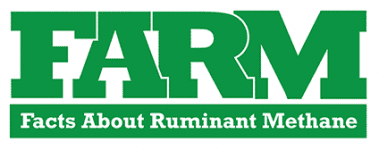Facts About Ruminant Methane (FARM)
More Facts About Ruminant Methane
New Zealand's Ruminant Methane emissions are stable - part of a natural cycle we depend on to grow grass
Agriculture is NOT responsible for 48% of New Zealand’s Greenhouse Gas emissions as is regularly claimed. This figure is based on a discredited Global Warming Potential (GWP) CO2 equivalence system that is clearly wrong.
Livestock are blamed for this 48% figure despite it being untrue. A leading international scientist involved in the origins of the GWP calculations, Dr Myles Allen, described the system as “not fit for purpose”.
Dr Clark and Dr Reisinger, directors of the NZ Greenhouse Gas Research Unit, state of the current system of using carbon dioxide equivalents, it “does not measure the actual warming caused by emissions and ignores the fact that methane does not accumulate in the atmosphere in the same way as CO2”. This is a damning admission of an epic fail in policy that has resulted in a system being adopted to quantify Methane emissions which ignores fundamental properties of ruminant Methane.
The calculation system does not take into account that stable Ruminant Methane emissions, as we have in New Zealand, do not cause an overall increase in atmospheric Methane and as a consequence the calculations vastly overstate the impact of New Zealand’s Ruminant Methane on any global warming.
It is claimed that Methane is 28 times more powerful as a GHG as Carbon dioxide. However, Methane is much more short-lived in the atmosphere and the natural Methane cycle that sees Ruminant Methane quickly breakdown into CO2 and Water Vapour before being taken up by growing grass means no new Methane is entering the atmosphere to cause any warming. This cannot be compared to say, oil taken out of the ground after millions of years and released as CO2 after combustion.
The mistake the GWP system makes is treating all Ruminant Methane emissions as if they were causing an increase in atmospheric Methane which they are not.
Quantifying any trace greenhouse gas in terms of carbon emissions is therefore unscientific and should not be part of any calculations. It is not an equitable or scientific basis for taxing farmers.
To see the video – The Methane Mistake
Ruminant Methane’s impact is heavily overstated.
Anti-farming groups, environmentalists, the Government, and global warmers focus on the quantity of Ruminant Methane emissions NZ farmers produce but never take in to account what impact these emissions have on the atmospheric concentration of greenhouse gas.
This is a fundamental mistake because how many emissions of Methane any activity produces is irrelevant if these emissions are cycling in an atmospherically neutral, natural manner and the atmospheric concentration of Methane is not increasing.
All Ruminant Methane emissions are treated as if they are causing the atmospheric concentration of Methane to increase whereas in fact most, if not all, are not. For that reason alone Ruminant Methane’s environmental impact is vastly overstated.
In addition, a number of peer reviewed published scientific papers are indicating that Methane is not able to absorb radiant heat in the way climate models assume. These papers are ignored by our scientists and remain unchallenged.
